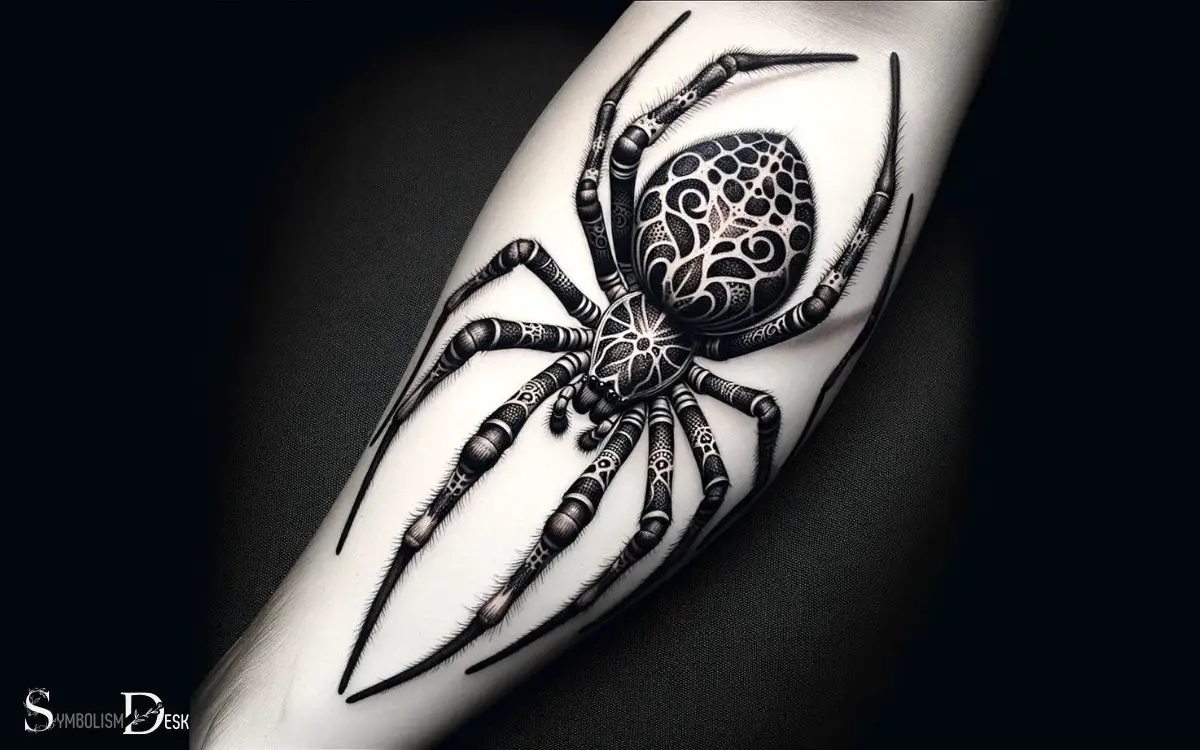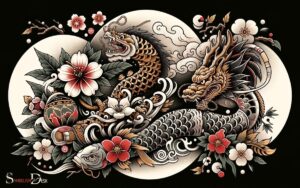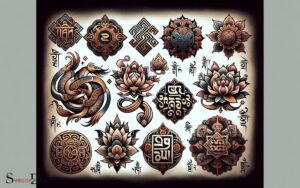What Does a Spider Tattoo Symbolize? Cunning!
A spider tattoo symbolizes a range of concepts including creativity, cunning, rebirth, protection, and complexity. It often reflects the wearer’s admiration for the spider’s ability to construct intricate webs and its role in various cultural mythologies.
The spider tattoo holds significant symbolism that varies across different cultures and individuals:
- Creativity and Patience: Just as spiders weave their webs, this tattoo can represent artistic talent and the patience required in crafting and life.
- Cunning and Intelligence: Spiders are often seen as strategic predators, so a tattoo may symbolize cleverness or intellectual power.
- Rebirth: Spiders cycle through life and rebuilding of webs, which can symbolize resilience and the idea of starting anew.
- Protection: In some cultures, spiders are seen as protectors against disease or evil spirits.
- Complexity: The intricate design of a spider’s web can signify the complexity of life or personal experiences.
Examples of cultural significance include:
- Native American: Often associated with storytelling and wisdom.
- West African and Caribbean: The spider is seen in the form of Anansi, a trickster god known for his intelligence.
- European folklore: Spiders are sometimes considered omens, both good and bad.
A spider tattoo intertwines personal meaning with cultural heritage, crafting a narrative as unique as the wearer’s own skin.

Key Takeaway
Origin of Spider Symbolism
The origins of spider symbolism can be traced back to various ancient cultures and civilizations around the world. In many societies, spiders represent patience, creativity, and female energy.
- For example, in ancient Egypt, the spider was associated with the goddess Neith, who was a creator deity and a mother goddess.
- In African cultures, the spider is often seen as a trickster figure, known for its cunning and intelligence.
- In Native American folklore, the spider is a symbol of creativity and storytelling.
- Additionally, in some Asian cultures, the spider is linked to wealth and good fortune.
These diverse interpretations highlight the significance of the spider in different societies and underscore its enduring symbolism in human history.
Cultural Meanings of Spider Tattoos
Spider tattoos hold diverse cultural meanings, reflecting both positive and negative symbolism across different societies.
The significance of these tattoos can vary widely, from representing creativity and patience in some cultures to embodying trickery and danger in others.
Understanding the historical context and cultural significance of spider tattoos can provide valuable insight into the complex symbolism associated with these designs.
Symbolism in Spider Tattoos
When getting a spider tattoo, individuals often express their connection to various cultural meanings and symbols associated with this design.
The symbolism in spider tattoos varies across different cultures and personal interpretations, including:
- Femininity: In some cultures, spiders are associated with femininity, creativity, and the weaving of life’s intricate patterns.
- Protection: For others, spiders symbolize protection and guardianship, as they’re known for creating intricate webs to catch their prey.
- Mystery and Power: Many people view spiders as mysterious creatures with powerful venom, representing strength and enigma.
- Transformation: In certain belief systems, spiders are seen as symbols of transformation and rebirth, as they shed their skin and create new webs.
Understanding the symbolism behind spider tattoos can help individuals convey deeper meanings through their body art.
This symbolism ties into the subsequent section about the ‘cultural significance of spiders’.
Cultural Significance of Spiders
Exploring the cultural significance of spiders in the context of tattoo symbolism, how do various societies interpret the imagery of spiders in body art?
In many cultures, spiders hold different meanings.
- For instance, in some Native American traditions, the spider is seen as a creator and symbol of wisdom.
- In African folklore, Anansi, the spider, is a complex character representing both wisdom and mischief.
- In Japanese culture, the spider is associated with protection and good fortune.
- In European folklore, spiders are linked to fate and the weaving of destiny.
Understanding these diverse cultural interpretations is essential when considering a spider tattoo’s significance.
It highlights the need to appreciate the complexity and depth of meaning that spider tattoos can hold, rooted in various societies’ beliefs and narratives.
Historical Spider Tattoo Meanings
The historical meanings of spider tattoos reflect diverse cultural interpretations and have evolved over time.
- Native American Culture: In Native American cultures, spiders are often associated with creation stories and the weaving of destiny. The Hopi people, for example, view the spider as a symbol of creativity and wisdom.
- African Culture: In many African cultures, the spider is seen as a symbol of mischief and creativity. Anansi, the spider trickster, is a popular figure in African folklore and is known for his cleverness and ability to outwit adversaries.
- Asian Culture: In some Asian cultures, the spider is associated with patience, balance, and harmony. In Japanese folklore, the spider is linked to the story of the goddess of mercy, Kannon, who’s said to have transformed into a spider to save a distressed traveler.
- European Culture: In European folklore, spiders are often associated with fate and fortune. The image of the spider weaving its web has been interpreted as a representation of the interconnectedness of life and the inevitability of destiny.
Symbolism in Different Tattoo Styles
Spider tattoos symbolize different meanings in various tattoo styles, reflecting the diversity of interpretations across different cultures and individuals.
- In traditional American tattooing, spiders are often associated with protection and good luck.
- In Japanese tattoo art, the spider represents defense and the ability to navigate life’s challenges.
- In blackwork and dotwork styles, spiders can symbolize mystery, darkness, and the unknown.
Neo-traditional spider tattoos often incorporate vibrant colors and intricate details, symbolizing a blend of traditional and contemporary meanings.
Realism-style spider tattoos focus on capturing the lifelike essence of the creature, emphasizing its predatory and elusive nature.
Each tattoo style offers a unique perspective on the symbolism of spider tattoos, allowing individuals to choose a style that resonates with their personal interpretation and cultural background.
Spider Tattoos in Mythology and Folklore
Spider tattoos have a rich history in mythology and folklore, carrying deep cultural significance. These tattoos often symbolize various traits and characteristics associated with spiders, such as patience, creativity, and cunning. Furthermore, in many cultures, spider tattoos are also believed to represent the idea of balance and interconnectedness, as spiders are seen as weavers of fate and interconnectors of life. Some people also choose to get spider tattoos to symbolize the idea of fate or destiny, as spiders are often associated with intricate webs and the concept of weaving one’s own future. In contrast, cheetah tattoo symbolism often represents speed, agility, and a fierce, independent spirit. These tattoos are often chosen by individuals who resonate with the cheetah’s traits of adaptability and perseverance.
Exploring the mythological representations of spiders can provide valuable insights into the symbolism behind these tattoos.
Symbolism in Spider Tattoos
Symbolism in spider tattoos reflects the intertwining of mythology and folklore with the enduring human fascination with the enigmatic arachnid.
The symbolism of spider tattoos draws from various cultural beliefs and stories, capturing the essence of mystery and power associated with spiders.
- Creativity and Resourcefulness: In many cultures, spiders are seen as symbols of creativity and resourcefulness due to their ability to spin intricate webs.
- Fate and Destiny: Some myths depict spiders as weavers of fate, connecting them to the concept of destiny and the intricate weaving of life’s path.
- Protection and Patience: Spiders are often associated with protective qualities and patience, as they carefully construct their webs and wait for their prey.
- Transformation and Rebirth: In certain beliefs, spiders symbolize transformation and rebirth, as they shed their old exoskeletons to grow and evolve.
Cultural Significance of Spiders
Exploring the cultural significance of spiders in mythology and folklore reveals the enduring influence of these arachnids on the symbolism of spider tattoos.
Across various cultures, spiders have been depicted as symbols of patience, creativity, and cunning.
In many mythologies, they are associated with creation and storytelling, often weaving intricate webs that symbolize the interconnectedness of life.
This rich cultural history has significantly influenced the meaning of spider tattoos, making them a powerful symbol of craftiness, resourcefulness, and the delicate balance between life and death.
Below is a table that provides examples of how spiders are portrayed in mythology and folklore in different cultures:
| Culture | Spider Symbolism |
|---|---|
| Greek | The weaver Arachne challenged the goddess Athena and was transformed into a spider |
| Indigenous | Spiders are often seen as creators of the world and storytellers |
| African | Anansi, the spider god, is known for his cunning and wisdom |
Understanding the diverse cultural perspectives on spiders enriches the symbolism of spider tattoos, making them a meaningful and deeply personal choice for many.
Mythological Spider Representations
The diverse cultural representations of spiders in mythology and folklore continue to shape the symbolism of spider tattoos, reflecting themes of craftiness, resourcefulness, and interconnectedness across different cultures.
Ancient Greece: In Greek mythology, the weaver Arachne was transformed into a spider by the goddess Athena, symbolizing the origin of spiders and their association with weaving and creativity.
Norse Mythology: The Norns, female beings who ruled the destiny of gods and men in Norse mythology, were often depicted with spider motifs, symbolizing their role in weaving the fate of individuals.
African Folklore: Anansi, the spider trickster, is a prominent figure in African and Caribbean folklore, representing cleverness, storytelling, and the ability to outwit more powerful foes.
Native American Traditions: In various Native American cultures, the spider is seen as a symbol of protection and creativity, often associated with the creation of the world and the weaving of destiny.
Interpretations in Contemporary Society
Spider tattoos are frequently seen in contemporary society, often symbolizing themes of mystery and creativity.
In today’s culture, spider tattoos are embraced for their association with independence and resilience. Many individuals choose spider tattoos to represent their ability to navigate life’s challenges with grace and strength.
These tattoos can also convey a sense of empowerment, as the spider is often seen as a symbol of female authority and assertiveness.
Additionally, in the modern context, spider tattoos can be appreciated for their aesthetic appeal and intricate designs. Some people may simply admire the visual artistry of spider tattoos without ascribing specific symbolic meanings to them.
Personal Meanings and Individual Connections
Frequently, individuals who choose to adorn themselves with spider tattoos do so to express deeply personal meanings and establish individual connections to the symbolism associated with the spider image.
- Strength and Resilience: Some people associate the spider with resilience and strength, using the tattoo to symbolize their ability to overcome challenges and adversity.
- Creativity and Artistry: For others, the spider represents creativity and artistry, serving as a reminder of their own creative abilities and the importance of weaving their own unique life story.
- Feminine Power: Many women connect with the spider as a symbol of feminine power, independence, and intuition, using the tattoo to celebrate their own strength and autonomy.
- Mystery and Intrigue: Some individuals are drawn to the enigmatic nature of spiders, using the tattoo to convey a sense of mystery and intrigue in their personal narrative.
Spider Tattoos: Empowerment and Strength
Often chosen as a symbol of empowerment and strength, spider tattoos convey a sense of resilience and determination to overcome challenges.
The image of a spider weaving its web represents the ability to create and control one’s destiny, making it a powerful symbol for those seeking inner strength and empowerment.
For many, the spider’s ability to adapt to various environments and situations reflects their own journey of overcoming obstacles and adversity.
The tattoo serves as a reminder of the wearer’s resilience and capability to navigate life’s complexities with grace and determination. It becomes a source of empowerment, symbolizing the strength needed to face and conquer personal struggles. For some, the four leaf clover tattoo meaning ties deeply into this sentiment, representing both luck and the ability to create one’s own fortune through perseverance. Each leaf can serve as a metaphor for qualities like hope, faith, love, and luck, which together embody the essence of overcoming adversity. This symbolism transforms the tattoo into not just body art, but a deeply personal emblem of inner strength and aspirational growth.
Spider tattoos not only exude a sense of strength but also embody the idea of embracing one’s individual power in the face of adversity.
Conclusion
Spider tattoos hold diverse cultural meanings and symbolism, from creativity and balance to patience and resilience.
They’ve been revered in mythology and folklore, and continue to empower individuals in contemporary society.
Whether representing personal connections or inner strength, spider tattoos remind us that we’re capable of weaving our own destinies.
Like the spider spinning its web, these tattoos serve as a reminder of the interconnectedness and complexity of life.






